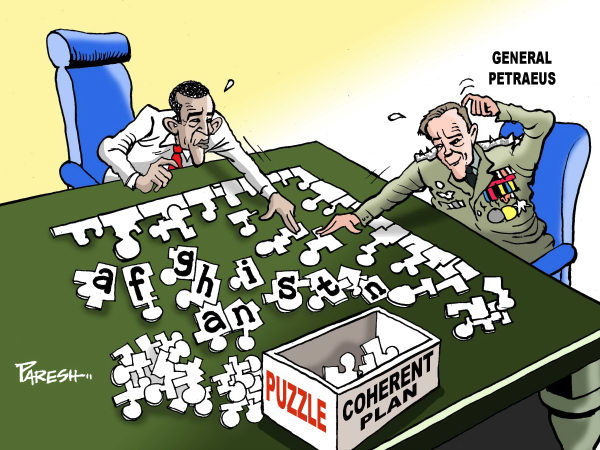Search
Democracy Links
Member's Off-site Blogs
spotting the enemy .....

How much faith do we have in intelligence gathering in Afghanistan? Scores to be settled by locals? Frankly, somebody designated as an "enemy" by Western forces may not be anything of the sort, simply a legitimate resistance to foreign occupation.
Besides, the West is in bed with a Kabul government backed and run by drug lords. Once again, Australia has been co-opted into the dirty business of propping up an illegitimate regime:
Australian police in Afghanistan have helped compile secret intelligence files on insurgent leaders later targeted in capture-or-kill missions by special forces soldiers.
The Pentagon has confirmed that Australian Federal Police officers are "assigned to work with" a joint police taskforce in Kabul that produces files later used by military commanders to "shape the battlefield" - a term often used to describe the capture-or-kill raids mounted by elite troops in Afghanistan.
While Australian police are officially not allowed to contribute intelligence for military purposes, in reality they have little control over who uses the information they help compile once it is shared with the Afghan government and other forces.
Cables released by WikiLeaks show how the joint police effort in Kabul has been hampered by a lack of staff. A request from the US embassy in October last year said more officers were needed to help others working in the Afghan Threat Finance Cell in Kabul under the joint command of the Afghan government and NATO.
One cable says the group "urgently requires access to translators [for] an increasing amount of wire-intercept information including complex technical and financial records" as the police target halawas - the informal money networks that far outnumber proper banks and are often used by drug traffickers
The last AFP officer stopped working directly with the Threat Finance Cell in April, but officers still work with the broader police effort called the Counter Narcotics Joint Inter-Agency Task Force, and their intelligence is shared with Afghan police and other agencies.
There has been a rise in capture-or-kill missions aimed at insurgents, with as many as 17 raids each night across Afghanistan by special forces teams from the US, Britain, Australia and other countries.
The soldiers work from a secret hit list - a centralised military database that includes information from police intelligence. US military officers have previously confirmed that some of those targeted include Afghans involved in narcotics who have strong links to the insurgency. One general told a US Senate committee that the aim was to "persuade them to choose legitimacy or [we] remove them from the battlefield".
- By John Richardson at 29 Dec 2010 - 5:59am
- John Richardson's blog
- Login or register to post comments
Recent comments
10 min 8 sec ago
41 min 51 sec ago
1 hour 18 min ago
1 hour 44 min ago
1 hour 54 min ago
3 hours 5 min ago
5 hours 28 min ago
15 hours 13 min ago
15 hours 23 min ago
15 hours 36 min ago